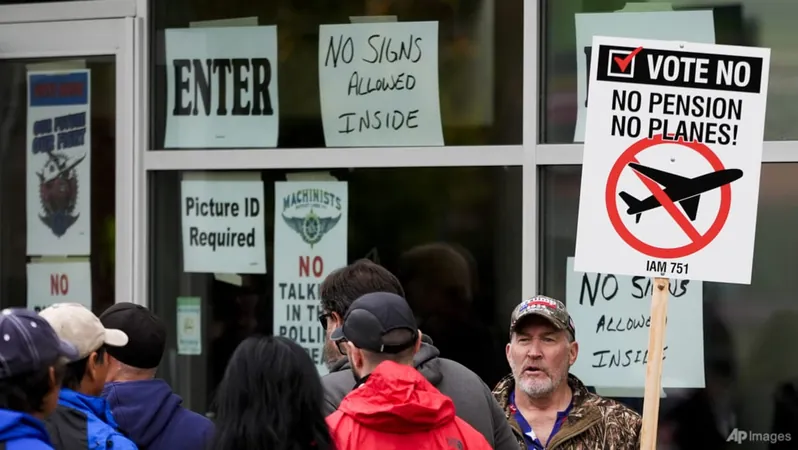
Boeing Workers Stand Firm as Wage Deal is Overwhelmingly Rejected
2024-10-24
Author: Daniel
Boeing Workers Stand Firm as Wage Deal is Overwhelmingly Rejected
In a dramatic turn of events, Boeing factory workers in Seattle have voted decisively against a proposed contract, opting to extend their strike that has now entered its sixth week. On October 23, the workers rejected the deal by a staggering 64 percent, directly challenging newly appointed CEO Kelly Ortberg's strategy aimed at stabilizing the troubled aerospace giant's finances.
This rejected offer included a 35 percent wage increase spread over four years, yet it fell short of the union's demands. Workers are advocating for a more substantial pay raise of 40 percent and the reinstatement of a defined-benefit pension, which was eliminated in previous negotiations back in 2014. The union's discontent stems from years of stagnant wages that have not kept pace with inflation, all while Boeing has funneled billions into stock buybacks and executive bonuses.
Jon Holden, the lead negotiator for the union, expressed his desire to return to discussions with the company post-vote, indicating a willingness to negotiate in search of a more favorable outcome for the members, who feel their patience has been tested to the limit. “There are some deep wounds,” Holden said, highlighting the long-standing grievances workers harbor against Boeing.
The stakes are high for Boeing, which has seen around 33,000 machinists halt work at its West Coast facilities. The ongoing strike is disrupting the production of multiple aircraft models, including the highly sought-after 737 MAX, and poses risks to Boeing's reputation as the largest U.S. exporter. The urgency to strike a deal is intensified by the approaching presidential election scheduled for November 5, creating a political backdrop that could further complicate the negotiations.
In a noteworthy move, U.S. Secretary of Labor Julie Su intervened earlier this month to facilitate talks between Boeing and its key union, the International Association of Machinists (IAM), albeit to no avail so far.
Boeing is not only facing challenges on the labor front. It has announced plans to lay off 17,000 workers, and sources indicate that it may seek to raise up to $15 billion to maintain its investment grade credit rating. Current conditions have also forced airlines to trim flight schedules due to delays in aircraft delivery, adding further pressure on an already beleaguered aviation industry.
As the strike stretches into November, repercussions are being felt throughout Boeing’s supply chain. For example, fuselage supplier Spirit AeroSystems has warned of potential layoffs and intensified furloughs if the strike endures past the month, exacerbating the crisis.
Amidst the turmoil, the pressure is on Ortberg to secure a favorable agreement. Analyst Richard Aboulafia marks this moment as critical for Ortberg's leadership, indicating that his ability to navigate these negotiations will greatly impact Boeing's future. “They’ve got to get this done, and they’re in a position of weakness,” Aboulafia states, reflecting the urgency of the situation.
Workers have shown their resolve; many have voiced that they are prepared to continue striking until they achieve a more satisfactory deal. “We’re going to get what we want this time,” asserted Donovan Evans, a young machinist, illustrating the determination among the workforce to secure fair treatment from Boeing.
As the standoff continues, the implications of this strike will not only affect Boeing's operations but will also resonate through the larger U.S. economy—potentially impacting jobs and supply chains nationwide. Will Boeing listen to its workers and make a deal, or will the strike continue to deepen the company's financial challenges? Only time will tell.



 Brasil (PT)
Brasil (PT)
 Canada (EN)
Canada (EN)
 Chile (ES)
Chile (ES)
 Česko (CS)
Česko (CS)
 대한민국 (KO)
대한민국 (KO)
 España (ES)
España (ES)
 France (FR)
France (FR)
 Hong Kong (EN)
Hong Kong (EN)
 Italia (IT)
Italia (IT)
 日本 (JA)
日本 (JA)
 Magyarország (HU)
Magyarország (HU)
 Norge (NO)
Norge (NO)
 Polska (PL)
Polska (PL)
 Schweiz (DE)
Schweiz (DE)
 Singapore (EN)
Singapore (EN)
 Sverige (SV)
Sverige (SV)
 Suomi (FI)
Suomi (FI)
 Türkiye (TR)
Türkiye (TR)
 الإمارات العربية المتحدة (AR)
الإمارات العربية المتحدة (AR)